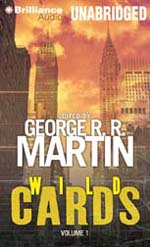

Just in, this very interesting anthology, edited by Stefan Rudnicki! I couldn’t find a Table of Contents on this package or on the Audible site, so I included it below. Why don’t audio publishers find the Table of Contents important when it comes to anthologies and collections? Because… THEY ARE.
After seeing the contents, I’m eager to dive into this. Oliver Onions, Guy de Maupassant, Harlan Ellison, John Crowley… Harlan Ellison reading John Crowley… this is terrific!
TABLE OF CONTENTS
INTRODUCTION
Lofty Ambitions by Harlan Ellison, read by Harlan Ellison
PART 1: THE MYTHS WE LIVE BY
A Youth In Apparel That Glittered by Stephen Crane, read by Stefan Rudnicki (poem)
After the Myths Went Home by Robert Silverberg, read by Stefan Rudnicki
Novelty by John Crowley, read by Harlan Ellison
Pan And The Firebird by Sam M. Steward, read by Stefan Rudnicki
Murderer, The Hope Of All Women by Oskar Kokoschka, performed by cast
The Touch Of Pan by Algernon Blackwood, read by Stefan Rudnicki
The Lost Thyrsis by Oliver Onions, read by Roz Landor
The Bacchae (excerpt) by Eurpides, performed by cast
PART 2: MYTHS THAT BITE
A Noiseless Patient Spider by Walt Whitman, read by Stefan Rudnicki
Mystery Train by Lewis Shiner, read by John Rubenstein
Continued On The Next Rock by R.A. Lafferty, read by Stefan Rudnicki
Diary Of A God by Barry Pain, read by Enn Reitel
The Repairer of Reputations (excerpt) by Robert W. Chambers, read by Stefan Rudnicki
The Yellow Sign by Robert W. Chambers, read by Stefan Rudnicki
An Inhabitant Of Carcosa by Ambrose Bierce, read by Danny Campbell
The Horla by Guy de Maupassant, read by Arte Johnson
PART 3: SHOCKING FUTURES
Kubla Khan by Samuel Taylor Coleridge, read by Stefan Rudnicki (poem)
City Come A’Walkin (excerpt) by John Shirley, read by Don Leslie
A Pail Of Air by Fritz Leiber, read by Stefan Rudnicki
The Machine Stops (excerpt) by E.M. Forster, read by Roz Landor
Looking Backward and Equality (excerpts) by Edward Bellamy, read by David Birney
Gulliver’s Travels (excerpt) by Jonathan Swift read by Scott Brick
Utopia (excerpt) by Sir Thomas More, read byChristopher Cazanove
Monument To Amun by Queen Hatshepsut, read by Judy Young
PART 4: TRAVELING FOOLS
La Bateau Ivre by Arthur Rimbaud, read by Stefan Rudnicki
Inspiration by Ben Bova, read by Stefan Rudnicki
The Bones Do Lie by Anne McCaffrey, read by Stefan Rudnicki
A Princess Of Mars (excerpt) by Edgar Rice Burroughs, read by John Rubinstein
The Great Stone Of Sardis (excerpt) by Frank R. Stockton, read by David Birney
Alice’s Adventures In Wonderland (excerpt) by Lewis Carroll, read by Michael York
Diary Of A Madman (excerpt) by Nicolai Gogol, read by Stefan Rudnicki
The Inferno (excerpt) by Dante, read by Stefan Rudnicki
The Odyssey of Homer (excerpt), read by David Birney
PART 5: TRANSFORMERS
The Stolen Child by William B. Yeats, read by Stefan Rudnicki
The Porcelain Salamander by Orson Scott Card, read by Gabrielle de Cuir
Let’s Get Together by Isaac Asimov, read by Arte Johnson
Dracula (excerpt) by Bram Stoker, read by Simon Vance
Dr. Jekyll And Mr. Hyde (excerpt) by Robert Louis Stevenson, read by John Lee
Goblin Market by Christina Rossetti, read by Gabrielle de Cuir
Frankenstein (excerpt) by Mary Shelley, read by Stefan Rudnicki0\ *
The Laidly Worm of Spindleston Heugh (Traditional English Fairy Tale), read by Judy Young
A Midsummer Night’s Dream (excerpt) by William Shakespeare, performed by cast
The Ballad of Tam Lin (Celtic ballad), read by Stefan Rudnicki
Metamorphosis (excerpt) by Ovid, read by Cassandra Campbell
PART 6: REST IN PIECES
Hearse Song
The Conqueror Worm by Edgar Allan Poe, read by Stefan Rudnicki
The New Testament: Revelations (excerpt), read by Stefan Rudnicki
The Colloquy of Monos & Una by Edgar Allan Poe, read by Stefan Rudnicki and Gabrielle de Cuir
From the Crypts of Memory by Clark Ashton Smith, read by Danny Campbell
The Comet by W.E.B. DuBois, read by Mirron Willis
Sand (excerpt) by Stefan Rudnicki, performed by cast
Transience by Arthur C. Clarke, read by Bahni Turpin
The Illusionist by Gareth Owen, read by Stefan Rudnicki
Unchosen Love by Ursula K. LeGuin, read by Stefan Rudnicki
In Lonely Lands by Harlan Ellison, read by Harlan Ellison
News from Nowhere (excerpt) by William Morris, read by Stefan Rudnicki
PART 7: COMMENTARIES
The Special And General Joys of Science Fiction by Ben Bova, read by Stefan Rudnicki
Edgar Allan Poe 1809-1849 by Elliott Engel, read by Gabrielle de Cuir
Adolescence And Adulthood In Science Fiction by Orson Scott Card, read by Stefan Rudnicki
Posted by Scott D. Danielson




